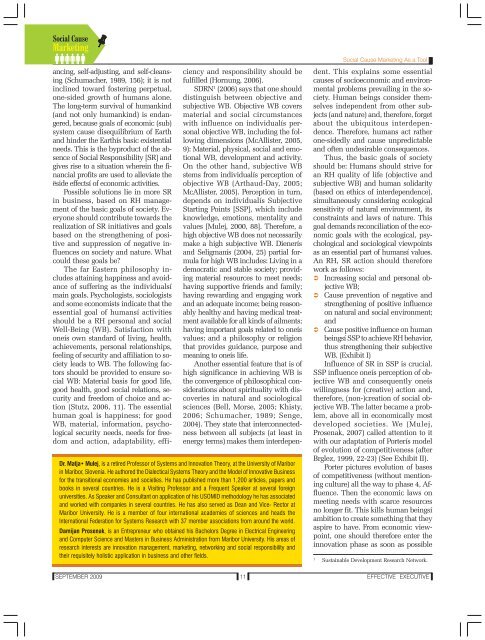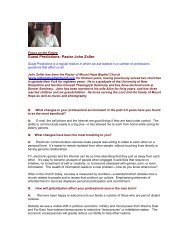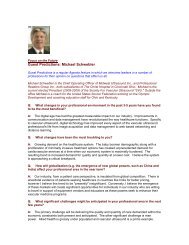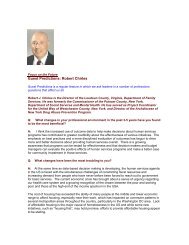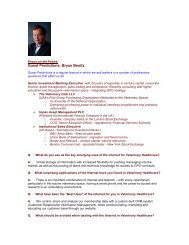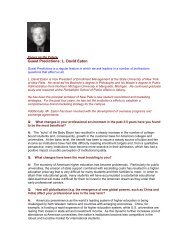Social Cause Marketing - The Regis Group Inc
Social Cause Marketing - The Regis Group Inc
Social Cause Marketing - The Regis Group Inc
Create successful ePaper yourself
Turn your PDF publications into a flip-book with our unique Google optimized e-Paper software.
ancing, self-adjusting, and self-cleansing<br />
(Schumacher, 1989, 156); it is not<br />
inclined toward fostering perpetual,<br />
one-sided growth of humans alone.<br />
<strong>The</strong> long-term survival of humankind<br />
(and not only humankind) is endangered,<br />
because goals of economic (sub)<br />
system cause disequilibrium of Earth<br />
and hinder the Earthís basic existential<br />
needs. This is the byproduct of the absence<br />
of <strong>Social</strong> Responsibility [SR] and<br />
gives rise to a situation wherein the financial<br />
profits are used to alleviate the<br />
ëside effectsí of economic activities.<br />
Possible solutions lie in more SR<br />
in business, based on RH management<br />
of the basic goals of society. Everyone<br />
should contribute towards the<br />
realization of SR initiatives and goals<br />
based on the strengthening of positive<br />
and suppression of negative influences<br />
on society and nature. What<br />
could these goals be?<br />
<strong>The</strong> far Eastern philosophy includes<br />
attaining happiness and avoidance<br />
of suffering as the individualsí<br />
main goals. Psychologists, sociologists<br />
and some economists indicate that the<br />
essential goal of humansí activities<br />
should be a RH personal and social<br />
Well-Being (WB). Satisfaction with<br />
oneís own standard of living, health,<br />
achievements, personal relationships,<br />
feeling of security and affiliation to society<br />
leads to WB. <strong>The</strong> following factors<br />
should be provided to ensure social<br />
WB: Material basis for good life,<br />
good health, good social relations, security<br />
and freedom of choice and action<br />
(Stutz, 2006, 11). <strong>The</strong> essential<br />
human goal is happiness; for good<br />
WB, material, information, psychological<br />
security needs, needs for freedom<br />
and action, adaptability, efficiency<br />
and responsibility should be<br />
fulfilled (Hornung, 2006).<br />
SDRN 1 (2006) says that one should<br />
distinguish between objective and<br />
subjective WB. Objective WB covers<br />
material and social circumstances<br />
with influence on individualís personal<br />
objective WB, including the following<br />
dimensions (McAllister, 2005,<br />
9): Material, physical, social and emotional<br />
WB, development and activity.<br />
On the other hand, subjective WB<br />
stems from individualís perception of<br />
objective WB (Arthaud-Day, 2005;<br />
McAllister, 2005). Perception in turn,<br />
depends on individualís Subjective<br />
Starting Points [SSP], which include<br />
knowledge, emotions, mentality and<br />
values [Mulej, 2000, 88]. <strong>The</strong>refore, a<br />
high objective WB does not necessarily<br />
make a high subjective WB. Dienerís<br />
and Seligmanís (2004, 25) partial formula<br />
for high WB includes: Living in a<br />
democratic and stable society; providing<br />
material resources to meet needs;<br />
having supportive friends and family;<br />
having rewarding and engaging work<br />
and an adequate income; being reasonably<br />
healthy and having medical treatment<br />
available for all kinds of ailments;<br />
having important goals related to oneís<br />
values; and a philosophy or religion<br />
that provides guidance, purpose and<br />
meaning to oneís life.<br />
Another essential feature that is of<br />
high significance in achieving WB is<br />
the convergence of philosophical considerations<br />
about spirituality with discoveries<br />
in natural and sociological<br />
sciences (Bell, Morse, 2005; Khisty,<br />
2006; Schumacher, 1989; Senge,<br />
2004). <strong>The</strong>y state that interconnectedness<br />
between all subjects (at least in<br />
energy terms) makes them interdepen-<br />
Dr. Matja• Mulej, is a retired Professor of Systems and Innovation <strong>The</strong>ory, at the University of Maribor<br />
in Maribor, Slovenia. He authored the Dialectical Systems <strong>The</strong>ory and the Model of Innovative Business<br />
for the transitional economies and societies. He has published more than 1,200 articles, papers and<br />
books in several countries. He is a Visiting Professor and a Frequent Speaker at several foreign<br />
universities. As Speaker and Consultant on application of his USOMID methodology he has associated<br />
and worked with companies in several countries. He has also served as Dean and Vice- Rector at<br />
Maribor University. He is a member of four international academies of sciences and heads the<br />
International Federation for Systems Research with 37 member associations from around the world.<br />
Damijan Prosenak, is an Entrepreneur who obtained his Bachelors Degree in Electrical Engineering<br />
and Computer Science and Masters in Business Administration from Maribor University. His areas of<br />
research interests are innovation management, marketing, networking and social responsibility and<br />
their requisitely holistic application in business and other fields.<br />
<strong>Social</strong> <strong>Cause</strong> <strong>Marketing</strong> As a Tool<br />
dent. This explains some essential<br />
causes of socioeconomic and environmental<br />
problems prevailing in the society.<br />
Human beings consider themselves<br />
independent from other subjects<br />
(and nature) and, therefore, forget<br />
about the ubiquitous interdependence.<br />
<strong>The</strong>refore, humans act rather<br />
one-sidedly and cause unpredictable<br />
and often undesirable consequences.<br />
Thus, the basic goals of society<br />
should be: Humans should strive for<br />
an RH quality of life (objective and<br />
subjective WB) and human solidarity<br />
(based on ethics of interdependence),<br />
simultaneously considering ecological<br />
sensitivity of natural environment, its<br />
constraints and laws of nature. This<br />
goal demands reconciliation of the economic<br />
goals with the ecological, psychological<br />
and sociological viewpoints<br />
as an essential part of humansí values.<br />
An RH, SR action should therefore<br />
work as follows:<br />
<strong>Inc</strong>reasing social and personal objective<br />
WB;<br />
<strong>Cause</strong> prevention of negative and<br />
strengthening of positive influence<br />
on natural and social environment;<br />
and<br />
<br />
<strong>Cause</strong> positive influence on human<br />
beingsí SSP to achieve RH behavior,<br />
thus strengthening their subjective<br />
WB. (Exhibit I)<br />
Influence of SR in SSP is crucial.<br />
SSP influence oneís perception of objective<br />
WB and consequently oneís<br />
willingness for (creative) action and,<br />
therefore, (non-)creation of social objective<br />
WB. <strong>The</strong> latter became a problem,<br />
above all in economically most<br />
developed societies. We (Mulej,<br />
Prosenak, 2007) called attention to it<br />
with our adaptation of Porterís model<br />
of evolution of competitiveness (after<br />
Brglez, 1999, 22-23) (See Exhibit II).<br />
Porter pictures evolution of bases<br />
of competitiveness (without mentioning<br />
culture) all the way to phase 4, Affluence.<br />
<strong>The</strong>n the economic laws on<br />
meeting needs with scarce resources<br />
no longer fit. This kills human beingsí<br />
ambition to create something that they<br />
aspire to have. From economic viewpoint,<br />
one should therefore enter the<br />
innovation phase as soon as possible<br />
1<br />
Sustainable Development Research Network.<br />
SEPTEMBER 2009<br />
11<br />
EFFECTIVE EXECUTIVE


